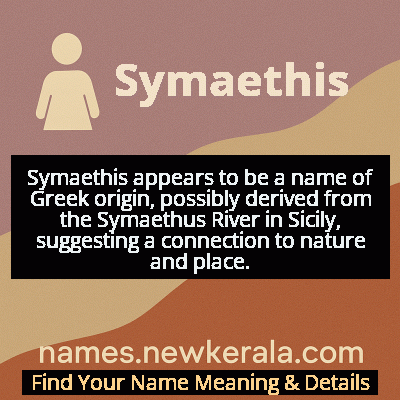Symaethis Name Meaning & Details
Origin, Popularity, Numerology Analysis & Name Meaning of Symaethis
Discover the origin, meaning, and cultural significance of the name SYMAETHIS. Delve into its historical roots and explore the lasting impact it has had on communities and traditions.
Name
Symaethis
Gender
Female
Origin
Greek
Lucky Number
2
Meaning of the Name - Symaethis
Symaethis appears to be a name of Greek origin, possibly derived from the Symaethus River in Sicily, suggesting a connection to nature and place.
Symaethis - Complete Numerology Analysis
Your Numerology Number
Based on Pythagorean Numerology System
Ruling Planet
Moon
Positive Nature
Diplomatic, friendly, artistic, empathetic.
Negative Traits
Over-sensitive, moody, indecisive, prone to self-pity.
Lucky Colours
Green, cream, white.
Lucky Days
Monday.
Lucky Stones
Pearl, moonstone.
Harmony Numbers
1, 3, 4.
Best Suited Professions
Diplomats, mediators, caregivers, artists.
What People Like About You
Cooperative spirit, friendliness, artistic talent.
Famous People Named Symaethis
Symaethis
Mythological Naiad
Nymph of the Symaethus River in Sicily, mother of Acis in Ovid's Metamorphoses
Symaethis (Literary Character)
Mythological Figure
Featured in Ovid's Metamorphoses as mother of Acis, who was loved by Galatea
Symaethis (Artistic Muse)
Inspirational Figure
Subject of various artistic works depicting river nymphs and Sicilian mythology
Name Variations & International Equivalents
Click on blue names to explore their detailed meanings. Gray names with will be available soon.
Cultural & Historical Significance
Extended Personality Analysis
Individuals named Symaethis would likely exhibit personality traits reflecting their mythological origins as river nymphs. The flowing nature of rivers suggests adaptability, emotional intelligence, and the ability to navigate complex situations with grace. Like water finding its way around obstacles, they might demonstrate creative problem-solving and persistence. The nurturing aspect of freshwater sources translates to strong caretaking instincts and emotional supportiveness. However, rivers also possess underlying power—they can be gentle and life-giving yet become formidable forces when necessary. This duality suggests someone who appears calm and accommodating but has deep reserves of strength and determination. The mythological connection to motherhood indicates protective qualities and strong family bonds. As a name rooted in natural cycles, it might correlate with intuitive understanding of timing and change, plus environmental awareness. The specific Sicilian context adds elements of cultural richness, tradition-honoring, and perhaps a Mediterranean warmth in social interactions. Overall, the name suggests a personality that balances fluid adaptability with steadfast core values.
Modern Usage & Popularity
In contemporary naming practices, Symaethis occupies a unique niche as an obscure mythological name experiencing gradual rediscovery. Its modern usage is almost exclusively among classically educated families, mythology enthusiasts, and those seeking truly distinctive names with deep cultural roots. The name appears occasionally in academic contexts, particularly in classical studies departments, and in creative works reimagining Greek mythology. While too rare to register on national naming charts, it represents several modern trends: the revival of classical names beyond the obvious choices (Athena, Apollo), the growing interest in nature-related names with mythological connections, and the search for unique feminine names with strong historical backing. The name's complexity (four syllables, uncommon phonetics) limits its widespread adoption but enhances its appeal for parents seeking both distinctiveness and meaningful heritage. Current usage is most visible in Greece, Italy (particularly Sicily), and among diaspora communities, with occasional appearances in English-speaking countries where parents are exploring beyond standard classical repertoire.
Symbolic & Spiritual Meanings
The symbolic resonance of Symaethis extends far beyond its literal meaning as a river nymph, embodying profound metaphors about existence and transformation. As a personification of flowing water, she represents life's journey—constant movement toward destinations while being shaped by and shaping the landscapes through which she passes. This mirrors human experience: we are both products of our environments and agents changing them. The freshwater aspect symbolizes purity, emotional clarity, and spiritual refreshment, suggesting someone or something that revitalizes and sustains. Her mythological role in the Acis and Galatea story adds layers of maternal protection, tragic love, and the intersection between different elemental realms (water meeting earth and sea). The geographical specificity—being tied to Sicily's Symaethus River—grounds these abstract meanings in real landscape, representing how universal human experiences are always situated in particular places and cultures. Ultimately, Symaethis symbolizes the beautiful paradox of constancy within change, the nurturing power of nature, and the enduring connection between human stories and the physical world that contains them.

